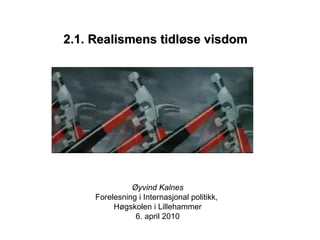
2.1. Realismens tidløse visdom
- 1. 2.1. Realismens tidløse visdom Øyvind Kalnes Forelesning i Internasjonal politikk, Høgskolen i Lillehammer 6. april 2010
- 5. Internasjonal politisk teori Ustabil Stabil Enkel Kompleks Fortolkning Handling Teori Realisme Liberalisme Marxisme Verden
- 7. Lost in realism? … ..et godt bilde av hvordan internasjonal politikk fungerer ifølge klassiske realistiske tenkere fra Thomas Hobbes til Hans J. Morgenthau. I «Lost» som i den klassiske politiske realismen er det nemlig den anarkiske samfunnstilstand som er utgangspunktet, uunngåelig ledsaget av individenes endeløse kamp for å sikre sin egen overlevelse. Life is lonely, poor, nasty, brutish and short! Thomas Hobbes’ fortelling i Leviathan og fortellingen i LOST? Kilde: Haugevik, 2007
- 10. … eller sagt som de tre S’er SURVIVAL Overlevelse (sikkerhet) STATISM Aktører suverene stater SELF-HELP Maktbalanse (relativ – relasjonelt)
- 14. Neo-realisme: Strukturalisme Kenneth Waltz: Defensiv realisme Nasjonalt: Hierarki vs Internasjonalt: Anarki Fordeling av “capabilities” mellom stater MAKTBALANSE: Unipolar, bipolar, multipolar Staters fokus på “sikkerhet” mer enn ekspansjon, unngå motreaksjoner MENNESKET egentlig ikke så interessant, fordi det er struktur som teller John Mearsheimer: Offensiv realisme Staters fokus på å maksimere egen relative maktposisjon på bekostning av andre stater. Dette gjør samarbeid særdeles vanskelig.
- 15. Er realister = hauker? Thousands of dangerous killers …., often supported by outlaw regimes , are now spread throughout the world like ticking time bombs , set to go off without warning. ... North Korea is a regime arming with missiles and weapons of mass destruction … Iran aggressively pursues these weapons and exports terror …. The Iraqi regime has plotted to develop anthrax, and nerve gas, and nuclear weapons for over a decade. States like these, and their terrorist allies, constitute an axis of evil , arming to threaten the peace of the world. By seeking weapons of mass destruction , these regimes pose a grave and growing danger . I will not stand by, as peril draws closer and closer . The United States of America will not permit the world's most dangerous regimes to threaten us with the world's most destructive weapons Bush 2002
- 16. Ad i NY Times 26. september 2002 Mearsheimer pluss 32 av USAs ledende realister
Notas del editor
- Tradisjonell betydning: Fysiske omgivelser: Kultur (menneskeskapte) vs. Natur En sektor blant mange i menneskelivet (i.e. kunst)
- Tradisjonell betydning: Fysiske omgivelser: Kultur (menneskeskapte) vs. Natur En sektor blant mange i menneskelivet (i.e. kunst)
- Hans Morgenthau (1948): The drives to live, to propagate and to dominate are common to all men
